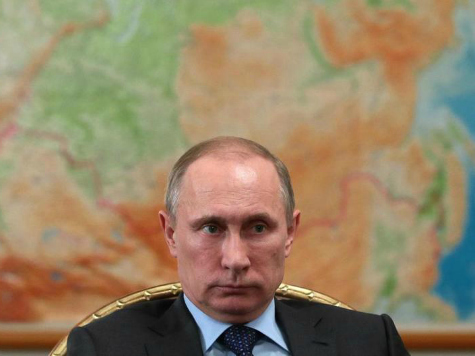
This morning’s key headlines from GenerationalDynamics.com
- Russia’s ruble currency drops to record low against the dollar
- Taiwan officials split on reaction to Hong Kong protests
- Polio cases surging in Pakistan to record-breaking levels
Russia’s ruble currency drops to record low against the dollar

Russian 500 ruble note
Apparently the European and American sanctions on Russia for thelatter’s invasion of Ukraine and annexation of Crimea are having someeffect, after all. The value of the ruble currency has fallen over 20%against the dollar this year. The ruble is now at the lowest pointsince it was restructured during Moscow’s traumatic 1998 debt default.
This comes at a time when Russia’s economy is suffering for otherreasons, particularly the falling price of oil. Libya has massivelyincreased production, and OPEC is producing more than forecast. Iraq,Nigeria, and Angola and Saudi Arabia have each boosted output. Theseincreased supplies of oil have pushed the price of oil down to $97 perbarrel on Tuesday, which reduces the price of all forms of energy,which is Russia’s main export.
The fall in the ruble is causing Russia to consider adopting capitalcontrols in order to stop the fall of the ruble. Possible capitalcontrols could include taxes, tariffs, and legislation banning orregulating certain activities, such as owning foreign assets.Russia’s Central Bank spent over $72 billion in the first three monthsof this year to prop up the ruble, as Russia’s seizure of Crimeacaused a huge currency selloff. Moscow Times and MarketWatch and Reuters
Taiwan officials split on reaction to Hong Kong protests
The size of the Hong Kong protests grew on Tuesday, although there wasno violence by either the police or the protesters. Hong Kong’s chiefexecutive, Leung Chun-ying, said: “The central government will not rescindits decision.” Both he and Beijing officials demanded that theprotesters go home immediately, suggesting that their patience wasebbing. The biggest protests are expected on Wednesday and Thursday,since those are public holidays celebrating the 45th anniversary ofMao Zedong’s Communist revolution.
Taiwanese officials are watching the events in Hong Kong closelyfor hints about how the Beijing government would treat Taiwanif its government came under direct control of China.
Taiwan’s president Ma Ying-jou, of the Kuomingtang (KMT) politicalparty, asked the mainland authorities and the demonstrators to showtolerance and self-restraint in handling the matter. Ma noted that asthe mainland authorities have promised Hong Kong self-administrationand a high degree of autonomy, the KMT believes that both Hong Kongand China stand to benefit if these promises are fulfilled.
The Kuomingtang (KMT) is the modern day incarnation of ChiangKai-shek’s original nationalist party that fought against Mao Zedongand lost and fled to Hong Kong, then a British colony, and from thereto Formosa (Taiwan) in 1949, at the conclusion of the civil war. TheKMT position has always been that Taiwan is part of China, and thatone day they’ll be fully reunited.
Joseph Wu, the head of the opposition Democratic Progressive Party(DPP), said that the Hong Kong and China governments should be moreopen and receptive to the voices of the people and the wisdom of itscitizens, and that the government should reassess its position.
The people of Taiwan watched the 1989 Tiananmen Square massacre inBeijing with horror, and it led to the Wild Lily student rebellion in1990. By 2000, the student rebellion had morphed into the DemocraticProgressive Party (DPP) which, in contrast to the KMT, was committedto Taiwan’s complete independence from China. DPP has moderated thatopinion in the face of military threats from Beijing.
With regard to the Hong Kong demonstrations, both political partiessaid that the outcome of the demonstrations would affect Taiwan’srelations with China. Depending on the response by Chineseauthorities, the DPP did not rule out a “drastic” change in policy.USA Today / AP and China Post (Taipei)
Polio cases surging in Pakistan to record-breaking levels
Pakistan’s health officials have confirmed another 10 polio cases onMonday. Pakistan is now only 15 cases short of breaking its own14-year-old record of 199 polio cases in the year 2000. This is amajor setback for a country that as recently as 2005 saw just 28cases, and seemed on track for polio eradication.
Most of the polio cases are in Pakistan’s tribal area and northwestprovinces, where the Taliban has the greatest strength. Pakistan hasbeen a particular problem because the Taliban have been murderinghealth care workers in Pakistan involved in providing polio vaccines,ever since the administration bragged in 2011 that a vaccinationprogram in Pakistan was used as a cover to locate and capture Osamabin Laden. In a recent day-long national campaign, over 16,000children could not be vaccinated due to their parents’ resistance.Many parents refuse vaccinations due to fear of Taliban who say thatthe polio medicine is a conspiracy by the West to sterilize Muslims.The Taliban have attacked and killed health workers who provide thevaccines, as well has parents who permit their children to bevaccinated.
Nigeria, Afghanistan and Pakistan are the three remaining countrieswhere polio is endemic. The News (Islamabad) and IRIN (United Nations) and Business Standard (India)
KEYS: Generational Dynamics, Russia, ruble, Ukraine, Crimea,OPEC, Libya, Iraq, Nigeria, Angola, Saudi Arabia,China, Hong Kong, Taiwan, Leung Chun-ying,Ma Ying-jou, Kuomingtang, KMT, Chiang Kai-shek,Joseph Wu, Democratic Progressive Party, DPP,Pakistan, polio, Osama bin Laden, Taliban,Nigeria, Afghanistan
Permanent web link to this article
Receive daily World View columns by e-mail

COMMENTS
Please let us know if you're having issues with commenting.